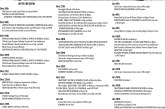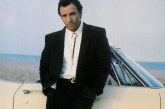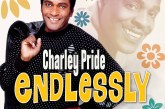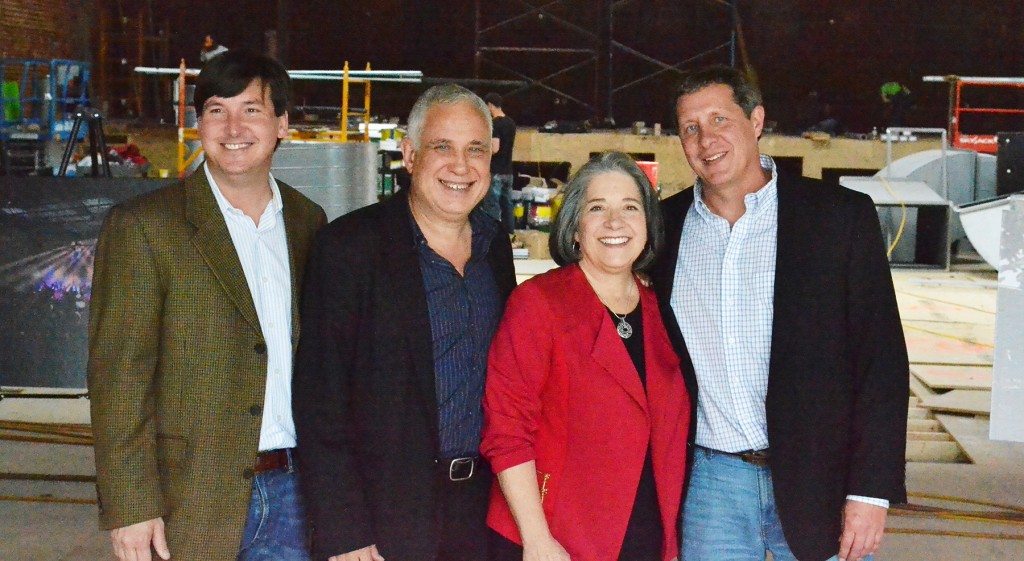
at the opening of the Mill & Mine. BIG EARS housed the Venue’s first shows. •
photo by Rusty Odom
Big Ears founder Ashley Capps interview • Madame Weezy’s Big Ears Horoscopes • Previews
From a purely logistical standpoint, Big Ears Festival is an East Tennessee success story that’s unparalleled in its ascendancy.
Consider: The annual event, which returns March 21-24 to the city center, continues to draw crowds not just from across the country, but from all around the world. In 2022 – the first year back after a two-year pause because of COVID – AngelouEconomics, a consulting firm based out of Austin, Texas, conducted an economic impact study of the festival and found that it contributed more than $36 million to the Knoxville economy, including $12.8 in labor income to Knoxville workers, $2.6 million in total tax expenditures and $193,082 to area nonprofits.
Last year, the festival grew by a whopping 48 percent over 2022, pushing the estimated economic impact above $50 million. And while obvious factors clearly play numerous roles in that success, Big Ears founder Ashley Capps is a big believer in what he thinks is the festival’s secret weapon.
“I think in many ways, it’s that Big Ears is in the Southeastern United States, and that it’s in Knoxville, Tennessee,” he told BLANK Newspaper recently. “For me, any great festival has a real sense of place. Sometimes it creates that sense of place in a field, like Bonnaroo might, and sometimes it’s very much about the character of the city and the community in which it’s taking place. With Big Ears, a celebration of the local and the regional and the national and the international is something that we aspire to, because I think the beautiful thing about art and music is how it connects people and how it brings people together and helps to nurture this shared experience.
“Big Ears is a celebration of all of these things, and to have it here is very much its secret weapon. The culture of the South – and the history of the culture of the South – is very rich and diverse, even as it’s also very troubled, but some really incredible work has emerged from those troubles: a triumphant artistry that’s essential to the Big Ears aesthetic. The South has been both revered and sometimes dismissed because, I think, of its really defiant individuality. All of these artists of old-time and bluegrass music, all of these greater writers of the South – there’s a real edge to all of that creation that comes from a very individualistic space that often stands apart from what was considered to be the traditional values of high culture or great art.
“Whether it was banjo picking or fiddle playing or high, lonesome singing or the blues tradition, it all forged a really unique path just as individualistic and avant-garde or experimental creations of anywhere else in the world,” he added. “Tie that to the African and Caribbean diaspora that mostly entered the U.S. through New Orleans and went up the Mississippi River to Memphis and over to Nashville and Knoxville and Bristol, and that melting pot is essentially the catalyst not just of American music, but music of all kinds.”
It was, he added, a revolution of sorts, one that’s still ongoing – and one that Big Ears plans to celebrate once again on the largest scale possible. It’s an extension of Capps’ original vision that came to fruition back in 2009, roughly three decades after booking his first show at the Laurel Theater for an itinerant cello savant named Tristan Honsinger. Through his own club (Ella Guru’s, located in the basement of what’s now The Melting Pot in the Old City) and his booking agency, AC Entertainment, he created an empire built on the curation of experiences. Big Ears took that ethos and became something more.
From the mainstream to the fringe, from veteran musical explorers to up-and-coming pioneers, it’s become a catalyst for creativity that absolutely must be experienced to be understood. Those who do come away mesmerized by what they’ve seen, and it’s little wonder that Big Ears has been lauded in publications around the world. There’s a current of spontaneity that’s baked into the concept, an idea that anything can happen with so many artists packed into downtown Knoxville – and it often does.
“For me, it’s a very satisfying and often exhilarating experience to plan it, to discuss so many ideas with artists and see which ones we can bring to fruition and which ones may have to wait a while, or maybe forever,” he said. “The biggest challenge has simply become logistical. The festival production team we relied on for so many years wasn’t there after I left AC, and it was absorbed into Live Nation, and building that new team has not been without its challenges, although we have a very great team now, and I’m very excited about that.
“And we’ve done that while the festival has grown so quickly. It’s doubled in size since 2019, to the point that this year, we decided to cap it. We felt the need to manage that growth and dial things in to really improve the overall experience as best we can rather than get stuck in this cycle of continual growth. For me, size has never been the goal of Big Ears. It’s about the experience and the character of the festival, and it’s challenging to manage that. There are a plethora of new opportunities and really wonderful ideas coming in, and we had to make the decision that we can’t do everything and still maintain what makes the festival special.”
By his calculations, the festival will likely sell out in the days leading up to its March 21 launch, and one look at the lineup leaves little doubt as to why. From familiar names (Herbie Hancock, Molly Tuttle, Laurie Anderson, Rhiannon Giddens) to Big Ears alums (Marc Ribot, Kronos Quartet, Mary Halvorson) … from local auteurs (Senryu, Tennessee Sheiks, Wyatt Ellis) to a last-minute addition that broke social media – André 3000, half of the hip-hop duo Outkast, who will perform his flute instrumental album “New Blue Sun” multiple times over the course of the long weekend – it’s another grand slam for an event that seems impossible to top every single year.
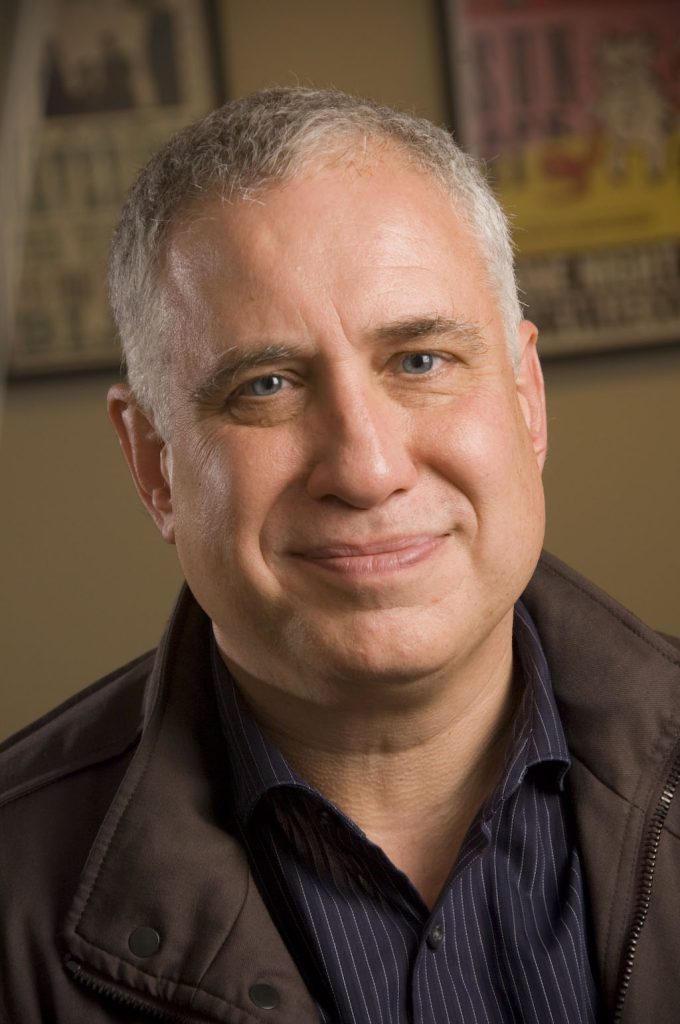
It’s a testament to the chief organizer that he approaches assembling the Big Ears components as an enthusiastic and passionate fan as much as he does from the perspective of a businessman.
“I have been doing this at this particular point for 40 years plus, and while I’ve done it professionally and worked to make a living and be successful at it, I’ve also done it as a fan, so my appreciation and love for music has been sustained through all of the challenges of also approaching it as a business,” Capps said. “I think that appreciation for the creative process has kept me perhaps open to possibilities and to exploring possibilities. And I have to point out: Many of these ideas don’t necessarily come from me but come from watching others and conversations with other people.
“It’s really creating an environment and an ecosystem where artists feel free to make suggestions and come to the table with ideas they may have, and my job is to be a catalyst for that whenever I can be. If there is something that I think sets Big Ears apart, it is a certain openness to possibilities. It’s one of the things I think keeps people on their toes and makes it a continual surprise, which goes for my staff as well. It can be challenging as new opportunities emerge, like the André 3000 residency.”
“New Blue Sun” was as surprising of an artistic pivot to Capps as anyone else, but when his people contacted Big Ears about adding André 3000 to the festival lineup, 2023 was coming to a close. Initially, it didn’t seem possible to make it happen, but the more the two sides talked, the more Capps came to understand what the musician wanted to accomplish with his presentation of the album.
What he also understood: Big Ears needed to make it happen.
“Our inclination whenever possible is to say, ‘Seize the moment,’ and this was a moment we felt that in whatever way possible needed to be seized,” he said. “It’s quite an extraordinary artistic pivot for someone who already has such an established career to go down such a unique and artistic path like that, and it seems central to the Big Ears experience to embrace that kind of change. The direction of ambient flute music, the meditative celebratory quality of what he was doing – that’s a very important part of the festival ethos itself.”
That ethos, he added, is a selling point as much as the names on the venue marquees scattered throughout downtown Knoxville. As the host of a most intricate and interesting of musical adventures, Capps will spend some of his weekend fellowshipping those individuals, many of whom are friends as much as colleagues. He’ll take care of last-minute emergencies and spur-of-the-moment problems, as he always does. But like the festivalgoers who will attend a party that brings the world to Knoxville, he’ll also be in the audience for as many shows as he can.
“Everything’s here for a reason. There really are no accidental bookings at Big Ears; everything is there because in my mind it fits into the tapestry of the entire weekend,” he said. “It almost becomes a musical utopia where you can explore so many different things depending on where your heart and mind take you and where your friends encourage you to go because, ultimately, the festival is created for the audience, not for me.
“My very best advice for experiencing the festival is to relax and go with the flow. Because as with many great festivals, the highlights for many who attend often end up being the unexpected. Being open to the experience in the various places it may lead is the most satisfying way to experience the festival.”
Big Ears founder Ashley Capps interview • Madame Weezy’s Big Ears Horoscopes • Previews
wildsmith@blanknews.com



